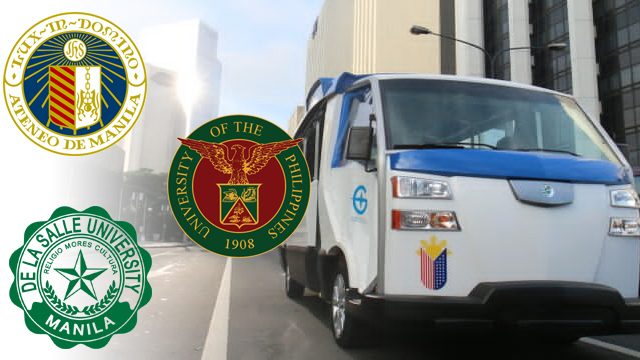SUMMARY
This is AI generated summarization, which may have errors. For context, always refer to the full article.

MANILA, Philippines – Around 2009, an initiative by the Parents Organization of La Salle Cavite, Inc. (POLCA) resulted in an investment on the first IKOT La Salle eJeepney. With the eJeepney emitting less noise and contributing nothing to air pollution, the De La Salle-Dasmariñas iniative paved the way for another De La Salle branch, the College of St Benilde in Taft Avenue, to have their own eJeepneys.
“We decided to fund the purchase of an eJeepney to improve not just our transport system inside the campus but also to help conserve the environment. There is less noise, no pollution to the air,” Dr Carmelyn Antig, then head of POLCA, said.
Late 2009, the Ateneo de Manila University (ADMU) launched the Ateneo eTrike. In their effort to have a more sustainable in-campus transportation, the eTrike made sense for it having zero carbon emissions and generating almost no noise, the eTrike was an appropriate choice of public transport vehicle within the school. ADMU continued this effort by launching the Ateneo eJeepney, an eJeepney in-campus transport system in 2014.
“Looking at the nitty-gritty, the realities of the power situation, I do believe that this is something that can address a very important issue which is climate change,” Fr Jett Villarin, ADMU President.
Most recently, the University of the Philippines-Diliman (UPD), my alma mater that inspired me to write this piece, proudly unveiled their version of a green vehicle for their plans to go green, in terms of in-campus transportation, in the next 5 years. It is currently on a trial run for two months before UPD and Bemac Electric Transportation Philippines Inc, the independent business entity lending the E-trikes, will do an assessment where UPD has the option to buy the units and continue the program. This initiative was spearheaded by the UPD administration as they hope to address the safety concern of their students especially during the nighttime.
“The vision of UP Diliman is to go green in the next 5 years. This will be a test of its feasibility,” said Nestor Castro, UP Vice-Chancellor for Community Affairs.
History of the E-Vehicle
In 2007, the Institute for Climate and Sustainable Cities (iCSC), a member organization of Aksyon Klima Pilipinas (AK), piloted the electric jeepneys (eJeepney) program in 2007 with the objective for the program to proliferate and be replicated in cities, towns, campuses, and communities in the Philippines. This initiative gave birth to the first eJeepneys that braved the streets in Makati and are still active to this day now known as the Makati Green Route (MGR). (READ: 11 things you may not know about electric vehicles)
Civil society organizations such as iCSC has been hoping that universities such as UP would take the lead in not only implementing low-carbon transport alternatives in their campuses, but also in taking on scientific and engineering studies on the efficiency and feasibility of electric vehicles. That call has not been met with deaf ears as different colleges have began embracing their role as primary movers in the e-vehicle movement. (READ: ‘One million electric vehicles in PH by 2020’)
Homework for everyone
While the universities study the feasibility and enforceability of the e-vehicle, much is also expected from everyone else. Unless there is a shift in the demand for sustainable energy, the smoke-belching tricycles and jeeps will keep dominating our streets.
The transport sector amounts to about a third of the total CO2 emissions of the Philippines. Statistics from the Department of Energy reveal that the road transport fuel consumption and corresponding CO2 emissions have increased alongside the increase of the total number of vehicles. (READ: Delayed PH electric vehicles road map eyes Q3 2015 launch)
“The energy sector is private sector-driven; it’s a free market even for investors,” said Zenaida Monsada, Officer-in-Charge, Philippines Department of Energy.
The initiative started by iCSC, supported by research and studies conducted and implemented by various universities, LGUs and independent institutions should signal the way that our transport system should be headed. It is not only up to our government to align their political will with the solutions and programs that civil society is offering but also for civil society to change our behavior.
Needless to say, whichever path the transport sector goes, the Filipino people will be there for the ride, paying not only the monetary fee but also the environmental cost. At least for the time being, students of our countries’ top universities enjoy a discounted rate for they still enjoy the beautiful trees and peaceful environment within their campuses, an experience the city commuter no longer have.– Rappler.com
Gene Angelo P. Ferrer is the National Coordinator of Aksyon Klima Pilipinas.
Add a comment
How does this make you feel?
There are no comments yet. Add your comment to start the conversation.